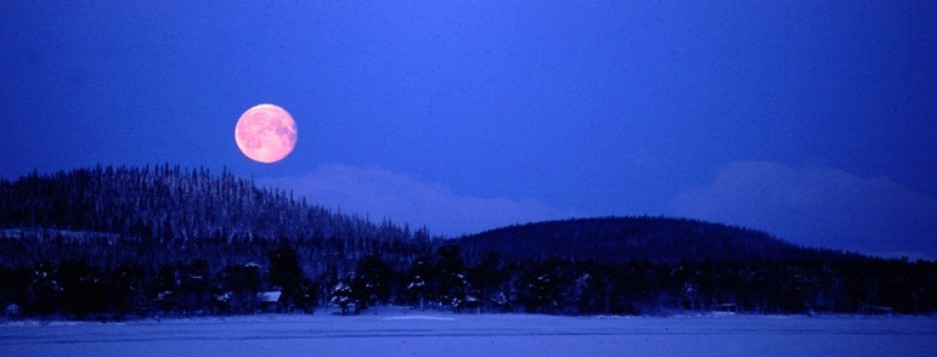
I was born in New Rochelle in 1978, when I was adopted by my parents (Jane and Jerry Bousel), and raised in Nutley, New Jersey, until 1990, when we moved to Tucson, Arizona. In 1996, I was part of the first graduating class of Catalina Foothills High School, and moved up to Portland, Oregon for 4 years to attend Reed College, where I graduated Phi Beta Kappa (though I technically never joined) in 2000, with a degree in English, focused on Creative Writing.
Like a lot of kids in the greater New York area, I developed an interest in theater early on, in great part due to my father’s love of Broadway shows and his willingness to take my sister and I to see them once we were old enough to sit in the audience quietly. I started acting in school and summer camp productions, and at thirteen made my professional performance debut playing a choirboy in Tosca at the Arizona Opera Company.
I spent most of my teenage years acting but wrote my first play, The Escapist, when I was 16. It was performed at my high school for one night only as part of an original play contest which I didn’t win. One of my fellow losers was, interestingly enough, Chris McCaleb, who has since gone on to work on some very prestigious projects including Breaking Bad and Better Call Saul. Chris and I would work together frequently over the next few years, with me voicing the character of Entak in his stop-motion animation short film Overlord, and co-writing another short, Insomnia, with him and Amanda Karam, for which he won the John C. Cosgrove Award. The moral of this story is don’t let high school determine your sense of self-worth in anything, but especially your art. Also, that I grew up with some awesome people, many of whom inspired the characters in my second play, Rumpelstiltskin, which I wrote during my final semester of high school.
My decision to go to Reed College, which in the late 90s had an excellent, but modest, theater department, is part of what pushed me away from life as an actor and more towards life as a writer. For all four years of school I was a member of Reed’s sketch comedy troupe, Midnight Theater, and Tucson based writer’s group Old Pueblo Playwrights from 1996-1999, so I continued to write plays, and occasionally act, most notably in school productions of The Bacchae and The Baltimore Waltz. In the summer of 1997 I made my directing debut when a small theater company in Tucson (on whose board my mother sat), needed someone to helm their production of Lysistrata. Greek mythology and classic literature having long been my other great love, I stepped in when offered the chance and ultimately ended up becoming the company’s artistic director.
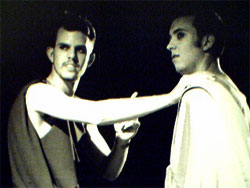
Quicksilver Productions, Inc. lasted from 1997-2002, and primarily functioned out of the Cabaret Theatre at the Arizona Theatre Company, with three shows performed at the Tucson Center For The Performing Arts, and one (You Can’t Take It With You) at The Leo Rich Theatre. Though not conceived as a Bousel family organization, it definitely became one, with myself, my mother, and my sister, Robin, heavily involved from beginning to end. Lysistrata was followed by productions of Edward Albee’s The Zoo Story, Christopher Durang’s Wanda’s Visit and Mrs. Sorken, all three directed by Robert Encila; The Butler Did It!, directed by Jasmine Koh; George Bernard Shaw’s Arms And The Man, directed by Debra Billman Weitzel; Kaufman and Hart’s You Can’t Take It With You, Durang’s ‘Denity Crisis, and Shakespeare’s A Midsummer Night’s Dream, all directed by Robin Bousel; William Saroyan’s Hello Out There!, directed by Dawn Acuna; Moliere’s The Forced Marriage, directed by Josh Galyen; and Charles Busch’s Psycho Beach Party, directed by Valerie Baugh, in which I played the part of Yo-Yo.
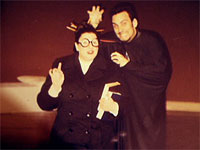
My next project with the group, however, was to adapt and direct Aeschylus’ Oresteia, which included my sister as one of the Furies, earned me some excellent reviews, and introduced me to Anne Heintz, who played Electra in the show, and with whom I would later run another theater company, Horror Unspeakable Productions.
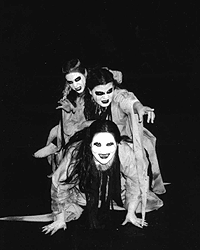
The name for “Horror Unspeakable” also came from this production, as it was a reference to a frequently misspoken line (“I see before me unspeakable horror”). The actress who said the line, Alba Jaramillo, was playing Cassandra, and while she frequently switched the words in question, her performance was otherwise flawless and almost ubiquitously praised by critics and audiences alike. As I jokingly said to Anne at the time, “If I ever have my own production company, we’ll be called Horror Unspeakable Productions, because the whole point is that we’ll do everything right, but go about it the wrong way.” The moral of this story: never say anything around me that sounds like a remotely good idea because I will probably end up acting on it, even if in reality, it’s not that great of an idea. Also, that I have often had the good fortune to work with truly excellent actors and artists who have happily taken all kinds of crazy risks with me.
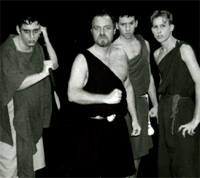
In January of 1999, Quicksilver produced a collection of one acts by myself, Anne Heintz, Chris McCaleb, Jasmine Koh, and Werner James, collectively titled I Laughed, I Cried, I Shot the Person Next to Me. One of Werner’s pieces, Man Sitting By The Phone, later went on to become a short film directed by Chris McCaleb re-titled The Trouble With Women. Werner would later star in the title role in the next Quicksilver Production I would direct, Faust Part One, a production which, if somewhat overly-ambitious for a 20 year old director, would still be kind of a break through for me as far as developing an aesthetic of my own. Actors played trees, created a moving hedge with their bodies, doubled as statues and objects of furniture, and identity in the play was intentionally confusing and ambiguous. Ideas I had started to play with in my writing, namely that people could be other people and themselves at the same time, found their first realization here and would later become the core idea of many of my plays at the time- Endymion, Vincent of Gilgamesh, The Troublesome Historie of Johann and Krane– and something I would keep revisiting in later pieces like See Also All, Age of Beauty, and Everybody Here Says Hello!
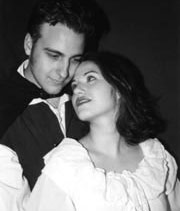
Over the summer of 1998 I penned the first draft of The Exiled, which was given its first production by Quicksilver, a three performance workshop, in January of 2000. This play would lay the foundation for a series of plays involving characters who were all connected in various ways- romantic relationships, drug use, school, children, work, art, and ultimately, real estate: Men and Women, Broken Dates, We Wrote This With You In Mind, A Late Lunch, Killing Me Softly, Edenites, The Age of Beauty, Dungeons and Democrats, Dancing, and, in the most tangental of ways, Everybody Here Says Hello!
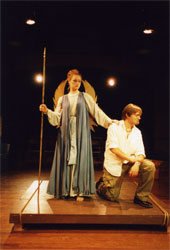
I would continue to return to Quicksilver over the next two years, to direct Cornielle’s Le Cid in 2002, and Derek Walcott’s stage adaptation of The Odyssey later that summer. The last show of Quicksilver Productions happened shortly before I left Tucson, and was a production of a play I’d been working on since high school, the meta-mythical comedy, A Random Act Of Creation, directed by my sister.
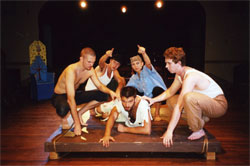
In the summer of 2000, freshly graduated from Reed and back in Tucson for a time, Anne Heintz and I formed Horror Unspeakable Productions, with my sister taking over as Artistic Director for Quicksilver, and Anne and I (along with our friend Josh Galyen as Technical Director) churning out a series of smaller, neoclassical and indie-film inspired productions, starting with Oscar Wilde’s Salome, and continuing with Christopher Marlowe’s Edward II.
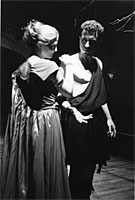
The later proved to be another step in the process of developing an aesthetic, with a angry aristocrat (Warwick, played by Brian McGrath) who was killed onstage turning into the Prince of Wales before the audience’s eyes, while a progressively covered in blood ghost of Piers Gaveston (played by Matt Bailey) embodied a kind of desire/death tension that’s proven to be another major theme for me.
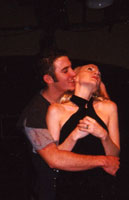
Over a short but active two years at the Cabaret Theatre, Horror Unspeakable also produced a second, more realized production of The Exiled, as well as a second production of my play Vincent of Gilgamesh (the first had been staged as my thesis at Reed). Anne directed the American premiere of Australian playwright Sarah Hammond’s Mounted and Pinned, as well as a very avant-garde production of Macbeth that included me in the title role, and witches dressed as Catholic school girls dancing around garbage cans, murdering children with nail files, and setting Banquo on fire (since Anne had already directed me as Horatio in her production of Hamlet that took place in a planetarium, this was pretty much business as usual for us). We brought Horror Unspeakable to a short but sweet finish in the summer of 2002 with a pair of one-acts we wrote and directed, my Attack of the Killer Space Zombies and Anne’s Snapshot. A few months later Anne moved to Australia where she directed a third production of Vincent of Gilgamesh, and the first international production of my writing. I, meanwhile, moved to San Francisco, where I started No Nude Men Productions.
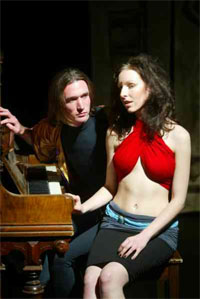
No Nude Men began as a one-off theater company/joke born from my mounting frustration with the Bay Area theater scene after a series of projects I got involved with never went anywhere. Rather poetically, in March of 2003, our first show was none other than Edward II, previously such an important piece for me and now my debut in my new home (both as director and as actor, as I stepped in to play the Warwick/Prince role). I produced the show in an empty room (what used to be the Build Space) on Guerrero Street with eight other intrepid actors who all wore black and white and performed barefoot. We ran for two weeks and were supposed to never perform again, but that plan didn’t exactly stick. The moral of this story is, never start something with the intention of going nowhere, because everything, to one extent or another, leads to something else. Also, that you never get out of anything what you think you will, and usually that’s a really excellent part of life, especially if, like me, you tend to have low expectations.
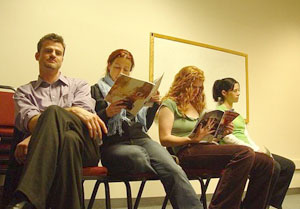
In the fall of 2003 No Nude Men found a temporary home at Spanganga, where I staged the world premieres of two new plays I’d written: Speak To Me and Troijka. When Spanganga’s doors closed we moved on to New Langton Arts, where another of my scripts premiered, Love Egos Alternative Rock, a piece inspired by a story my college chum Melissa Klepetar wrote, directed by another Reed friend, Jesse Baldwin, with whom I had done a great deal of Midnight Theater, and co-starred in The Baltimore Waltz (he later went on to do tech with the prestigious Oregon Shakespeare Festival). I directed a third production of The Exiled, this time at the alternative arts space the Xenodrome, before taking some time off to act in productions of Jacob Marley’s Christmas Carol at the Actors’ Theatre of San Francisco, and The Future of the Female in the Bay One Acts Festival. I mounted a second production of Speak To Me at the Off-Market Theater, but it wasn’t until the summer of 2005 that No Nude Men finally produced another show that wasn’t written by me: Nirmala Nataraj’s The Book of Genesis: Remixed and Remastered, which we premiered at the San Francisco Theater Festival.
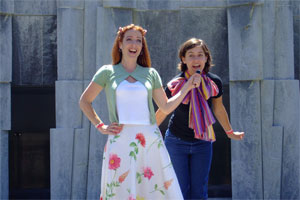
Weirdly enough, every theater that No Nude Men played at in the beginning closed down shortly after we were there, so it was kind of a turning point when we stumbled upon the Climate Theater, a small, second-story space above a dance club in the heart of San Francisco’s SOMA district. Our first show there was Jean Racine’s Phaedra, another artistic break-through for me and still one of my favorite accomplishments: transplanted into the Victorian Age but preserving Racine’s elegant text, staged in the round, lit mostly with candles and mirrors, with live generated sound effects (footsteps, slamming doors, music boxes), it most definitely planted the seed for my Victorian plays, especially Juno En Victoria, and began a period of classical theater experiments both for No Nude Men, and for me.
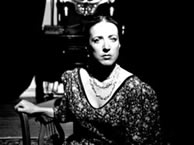
In spring of 2006 I directed my first Shakespeare production, Love’s Labors Lost. It also happened to be my first production at the EXIT Theatre, though we’d return to the Climate for the whole next year, now as a resident company, starting with a second production of Troijka under the direction of John Dixon. Tripple L, as it came to be known, was another breakthrough: placed in modern times, located in a hip bar and intercut with elaborate dance numbers (choreographed by Margery Fairchild and Alexis Perry), it continued my desire to mash up classical text with alternative music, modern crises of faith and identity, and to use unusual practicals in lightning: in this case, Christmas lights and votive candles. It also got me a job since Karen Offereins, then the artistic director of Atmostheatre, attended the show and enjoyed it enough to ask me to direct their production of A Midsummer Night’s Dream.
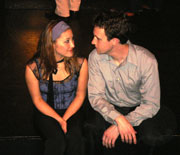
Midsummer was my first time being hired to direct for a company I hadn’t started (or that my mother wasn’t on the board of), and it was kind of a dream show- excellent cast, excellent designers, and did I mention the group performed in a redwood forest? I would go on to direct two more shows with them, Aristophanes’ The Frogs (my personal favorite of the shows I did at Atmostheatre) and Shakespeare’s Twelfth Night, as well as performing in their production of Alice In Wonderland, adapted by Brian Markley and directed by Amy Tasker.
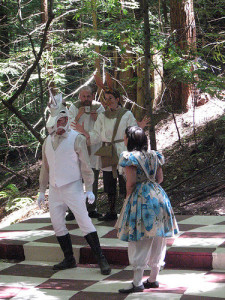
With Brian and Atmostheatre’s Executive Director, Victor Carrion, and writer/actor Bennett Fisher, I went on to found the San Francisco Theater Pub, a bar-based theater company where I have acted, written, directed, and produced a number of works over the years, ultimately becoming Executive Director in 2015. Productions I’ve helmed at Theater Pub include Measure For Measure and Taming of the Shrew, but my favorite Shakespeare I’ve directed is still the gender-swapped, vaguely gothic, very post-modern production of Hamlet that I directed in 2006 for No Nude Men. This was the last show we staged at the Climate Theater, which in the grand tradition of our early years as company, was closed down shortly after we left.

Since leaving the Climate, No Nude Men has worked almost exclusively at the EXIT Theatre, with occasional jaunts off to other venues when the nature of the play was better suited to a different locale. I directed the world premiere of Alison Luterman’s Oasis as part of an evening of one acts collectively titled, Cerberus Barking, which would be the one and only show we’d do at the EXIT on Taylor. This evening also included the first production of my play, Polyxena In Orbit, which some people continue to insist is the best thing I’ve ever written, and which I’ve occasionally toyed with turning into a children’s book.
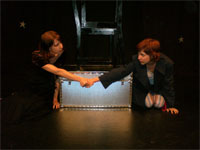
Using No Nude Men as a way to workshop my own work, usually directed by me, has allowed me to put up and try out a number of new pieces as I’ve written them: Mathew 33:6, The Age of Beauty, and Pastorella. Additionally, under the NNM banner I have directed a number of world premieres by other Bay Area playwrights, including Susan Sobeloff’s Merchants, Nirmala Nataraj’s adaptation of Matthew Lewis’ gothic novel The Monk, Claire Rice’s Woman Come Down, and David Duman’s Fishing, the later of which we staged in the demonstration kitchen of Periscope Cellars, an art gallery and winery inside a former navy warehouse in Emmeryville.
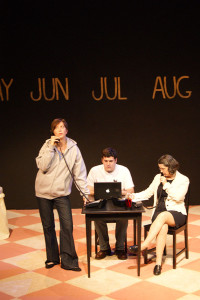
Fishing actually became the first No Nude Men show to go on tour, with an encore performance at the Dramatist Guild stage in Los Angeles.
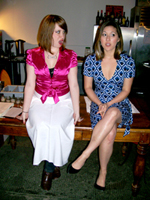
No Nude Men has done a lot of cool work neither written, nor directed, by me, including an all female production of Sarte’s No Exit, directed by Bekah McNeil, and Five Short Episodes In The Life of Sacagawea by David Duman, directed by Stacy Malia.

We’ve also produced a lot of world premiers over the years: Bennett Fisher’s Hermes, directed by Tore Ingersoll Thorpe; Better Homes and Ammo, written and directed by Wylie Herman; Hilde Susan Jaegtnes’s Spoon Justice, directed by Wylie Herman, Learning from Hilde’s Mistakes, directed by Chris Kelly, and Oily Replies, directed by Claire Rice; Ashley Cowan’s Word War, directed by Julia Heitner; Nirmala Nataraj’s A Grave Situation, directed by Ryan Hayes; Melissa Fall’s Test Prep, directed by Julia Heitner; Allison Luterman’s A Night In Jail, directed by Sara Judge; Erin Bregman’s In Search Of Explosive Possibility, directed by Claire Rice; and Marissa Skudlarek’s Pleiades, directed by Katja Rivera. Considering this theater company doesn’t officially exist and was never intended to last, it’s a rather impressive list and it continues to grow.
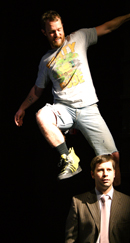
In 2006 we participated in the SF AIDS walk due to the efforts of company member Chris Carlone, and in 2008 we raised money (over $1100.00) to support Equality California in the legal battle for gay marriage by hosting an all queer reading of the Merchant of Venice, featuring Shakespeare scholar Denise Batista, novelist Peter S. Beagle, and Bay Area director, actor, and writer John Fisher (long-time artistic director of Theatre Rhino) on a discussion panel after the show.
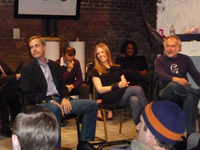
Peter, who wrote my favorite novel of all time, The Last Unicorn, would later become a collaborator as well, when I adapted his short story collection, Giant Bones, into a stage production co-produced by Conlan Media at the EXIT in 2010. It ran twenty performances (our longest running show to date) and had a huge, glowing giant puppet that looked amazing- and also fell on our lead actor, Rik Lopes, during the first preview.
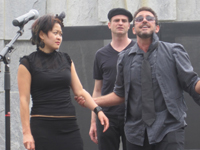
In April of 2007 we held an evening of new play readings, No Nude Men: Stripped, as a fundraiser. Featuring short works by me (my play Housebroken, later to be produced under the direction of Claire Rice as part of the 2010 Bay One Acts Festival), David Duman, Scott McMorrow, Bekah McNeil, Evelyn Jean Pine, Mike Ricca, John Robinson, and Andy Black, the evening was both a financial and aesthetic success. Discovering a knack for “readers theater” in both myself and my company, this was most certainly the seed of what has since come to be a signature event for both No Nude Men, and me: The San Francisco Olympians Festival.
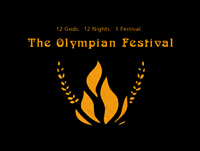
The first festival was held in the EXIT Stage Left in July of 2010, and was twelve nights of new plays which had been commissioned from proposals submitted by writers interested in crafting a full length play about one of the twelve Olympian Gods of Ancient Greece. The first festival involved fourteen Bay Area writers, eleven fine artists, five directors and seventy-two actors, and was attended by over 500 people. Since that first festival the Olympians has become a Bay Area tradition, growing in size each year, moving to the Main Stage of the EXIT, and switching from summer to autumn, with Year Two in October, Year Three in December, and Years Four through Six in November. Year Seven found us back in October, and Year Eight brought us back to the EXIT Stage Left (proving that everything moves in cycles). We’ve issued to anthologies via EXIT Press: Songs of Hestia (the best of Year One) and Heavenly Bodies (the best of Year Two) and a number of pieces first created for the festival have gone on to full productions in San Francisco and beyond.
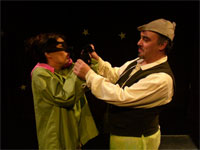
Outside of No Nude Men, Olympians, and Theater Pub, I have been fortunate enough to work with a wide variety of companies and collaborators. I was commissioned by the Cathedral School For Boys to adapt the legend of Jason and the Argonauts into a play, and in 2008 I made my New York playwrighting debut with a production of my short, Joe & Cleo: A Romance, mounted by Hyperion Theater Project and directed by Lori Sommer. My Chicago debut would follow in 2011 with The Exiled, produced by Harvest Arts and directed by my sister, and continue in 2015 with Gone Dark, directed by Tiffany Keane, and a new production of Polyxena in Orbit in 2016, directed by Jared McDaris, both for Otherworld Theatre Company. In San Francisco I have enjoyed long-term associations with several Bay Area Theater companies, in particular Wily West Productions and Custom Made Theatre.
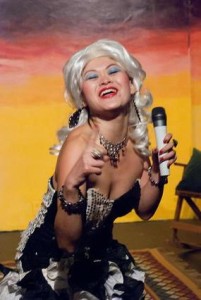
My association with Wily West began when I directed the 2010 world premiere of Morgan Ludlow’s Ruth and The Sea, which I attended a reading of a year earlier and fell in love with. Morgan has since been a tremendous champion of my work, producing the premiere productions of my plays A Late Lunch (directed by Soumyaa Kapil), Juno En Victoria (directed by Claire Rice), and Everybody Here Says Hello! (directed by Rik Lopes), the last of which ended up winning the Theatre Bay Area Award for “Outstanding World Premiere of a Play” in 2014, and has since gone on to a second production in Seattle, directed by Morgan for Pacific Play Company, and publication through EXIT Press- my first play to be published outside of an anthology.
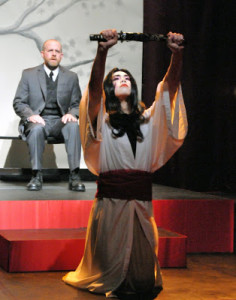
I directed my first show for Custom Made in 2011, David Henry Hwang’s M. Butterfly, in a visually vibrant rendering that began a continuously rewarding relationship with an ever-growing theater company dedicated to challenging and seminal work. Artistic Director Brian Katz let me follow up my first year with my dream production of Shakespeare’s The Merchant of Venice, really the culmination of the aesthetic concepts I’d been toying with in Edward II and Hamlet, a modernization at once entirely my own but reverent of the original text, and one of my best received shows in the Bay Area.
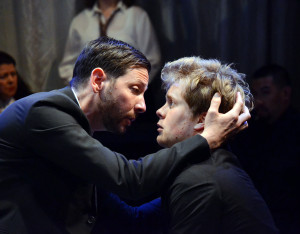
Since then I’ve directed Custom Made productions of Craig Lucas’ Prelude To A Kiss, Arthur Miller’s The Crucible, John Guare’s Six Degrees of Separation (my favorite play!), Wendy MacLeod’s The House of Yes, James Goldman’s The Lion In Winter, and the Doug Wright, Scott Frankel, Michael Korie musical of Grey Gardens. The last marks my first time directing a full-fledged musical (for which I was nominated for the 2015 Theatre Bay Area Award for Outstanding Director of a Musical), and would not have been possible without the collaboration of music director David Brown (who also played Gould in the show), and choreographer Kim Saunders (both also received nominations for their work). The moral of this story: there really is a difference between a play with songs and an actual, honest-to-God musical and you can’t pull it off unless you’re working with the best. Also that a really good design team (William Campbell, Brooke Jennings, Liz Ryder, and Stewart Lyle worked on both Crucible and Grey Gardens) makes epic theater even more epic.
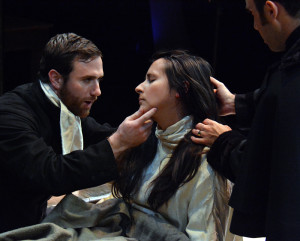
I continue to work at the EXIT, having started the first “Hospitality Lounge” at the San Francisco Fringe Festival in 2012, and having joined the staff as the publicist for the EXIT-based DIVAfest in 2014 when the organization produced my stage adaptation of alternative rock goddess Kristin Hersh’s memoir, Rat Girl, directed by Claire Rice. No Nude Men officially became a resident company at the EXIT with Pastorella, but long before that Christina Augello, Artistic Director of the EXIT, and Amanda Ortmayer, the Technical Director, were arguably the reason I’ve been able to mostly maintain my sanity and continue to explore what it means to make theater in the Bay Area. My first official day working in the EXIT office remains one of the most peaceful moments of my professional life. Artistically, my residency continues with a production of Desk Set in 2015 (co-produced with Megan Briggs and Allison Page under the No Nude Men banner), and the American premiere of Clive Barker’s Paradise Street in 2016. Most recently I directed A Life On The Ocean Wave, an anthology of sea chanty inspired one-acts by Carson Beker, Nara Dahlbacka, Nancy Au, and Conrad Panganiban.
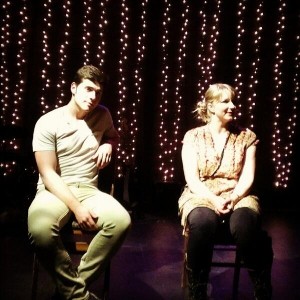
In addition to my creative pursuits, I was on the Individual Services Committee of Theatre Bay Area for several years, and from January through December of 2015 took over as the chair of the committee. In 2015 I also signed on to be the Director of New Work Development for Custom Made Theatre Company, and hired two new artistic directors (Tonya Narvaez and Meghan Trowbridge) for Theater Pub, which resumed monthly performances again, for two years, after a 16 month break during which we left the Cafe Royale, where we’d originally been based, to become part of the family over at the PianoFight space, a bar/restaurant/theater venue in the heart of the downtown San Francisco theater scene. With playwright/performer Megan Cohen I founded Saturday Write Fever, a monthly writer/actor meet-up at the EXIT Theatre, in 2013. Theater Pub continued to expand, including a daily blog maintained by a team of Bay Area writers and theater buffs, before effectively ceasing operations at the end of 2016. I, however, continue to do a fairly tongue-in-cheek annual “Best of” list, rather brazenly called “The Stuey’s.”
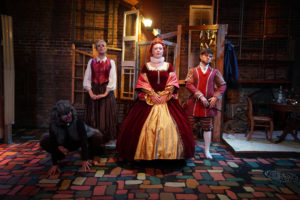
Somewhere along the way I wrote and published a short novel, Dry Country, wrote (and cameoed in) a mocu-mercial for Hostelling International called Wish U Were Here, wrote the libretto to Stephen Eddins’ short opera A Devil’s Deal, and tumbled into a long-term relationship/collaboration with artist Cody Rishell, known for the daily comic strip Clyde the Cyclops, and some of the best theater posters ever. Cody also proved to be part of the inspiration for my play Adventures In Tech (With Pillow Talk On The Side), produced by PianoFight in 2016 (they would go on to produce my play Twins in 2017) and directed by my long-time collaborator, Allison Page. Through Allison I would make my directing debut with legendary Bay Area sketch comedy group Killing My Lobster, helming their December 2017 holiday show, Bag of Dickens. In 2018 we would collaborate again on a new comedy, Vampire Christmas, and I would make another company debut, joining Left Coast Theatre Company for the first time to direct their production of The Laramie Project, sandwiched between two more shows at the EXIT: Exit The King, and my adaptation of Aristophanes’ The Congresswomen.
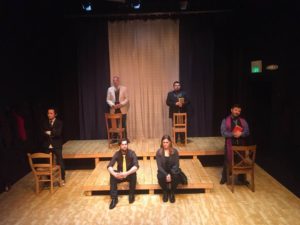
My resume lists it all in a much more organized fashion, but without all the pretty pictures.
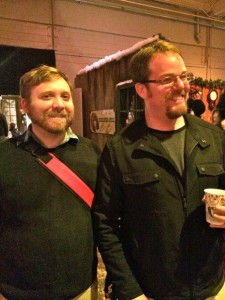
The moral of the story is that one should always find a way to share pretty pictures.
